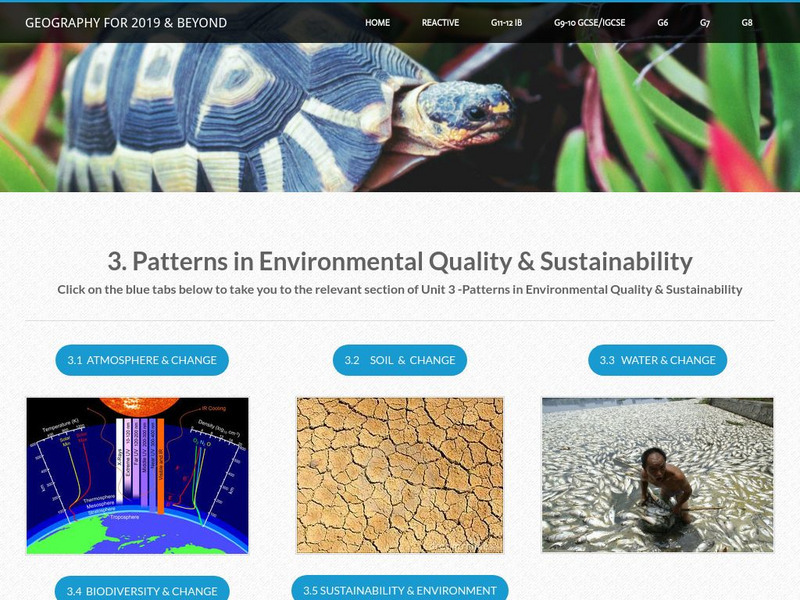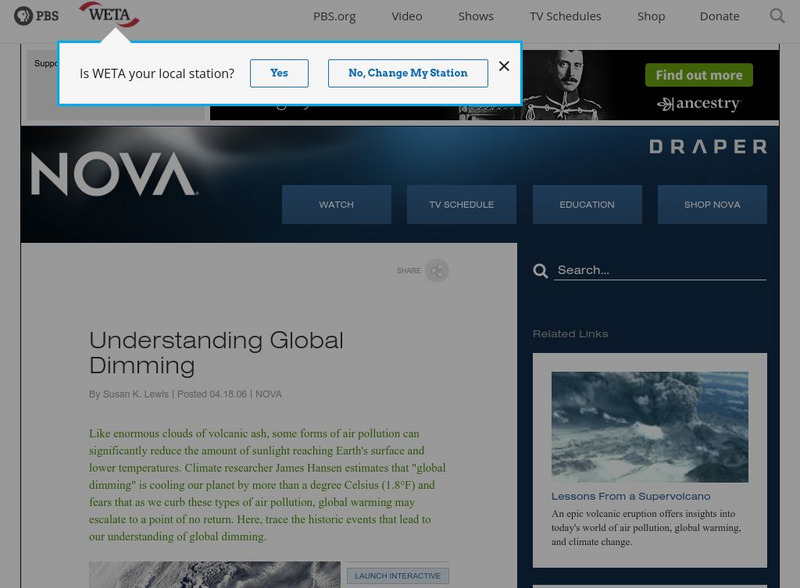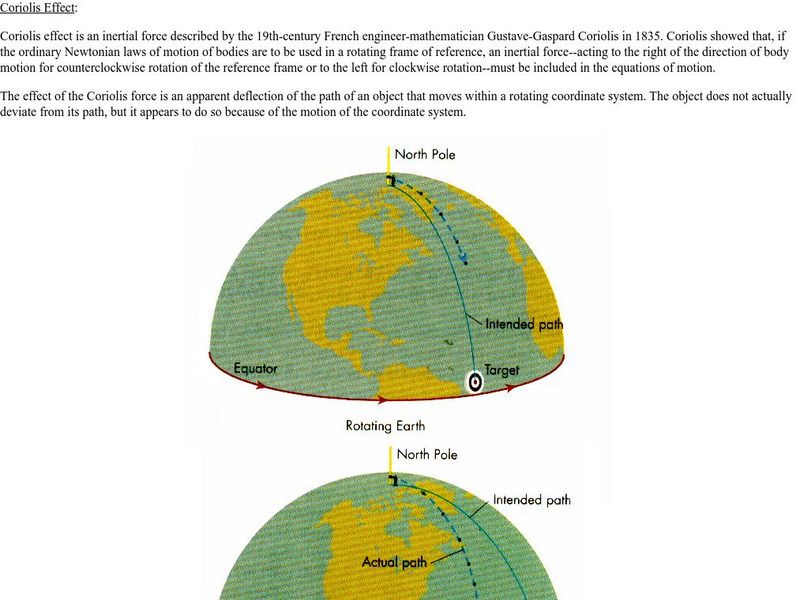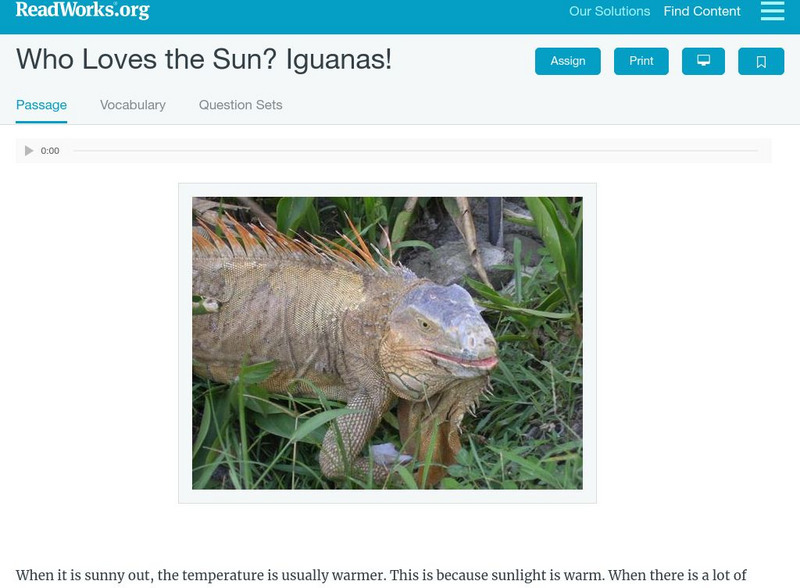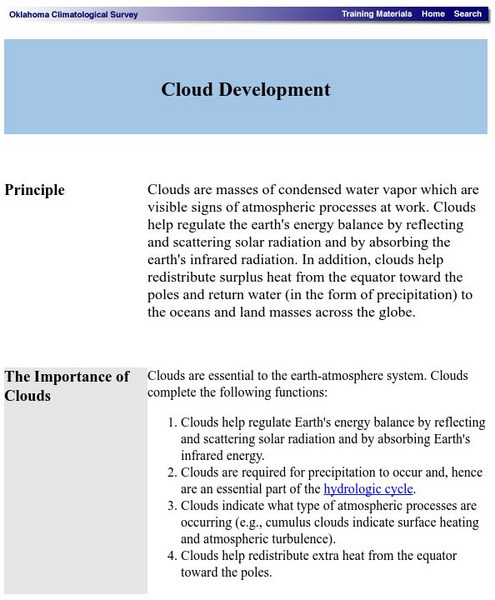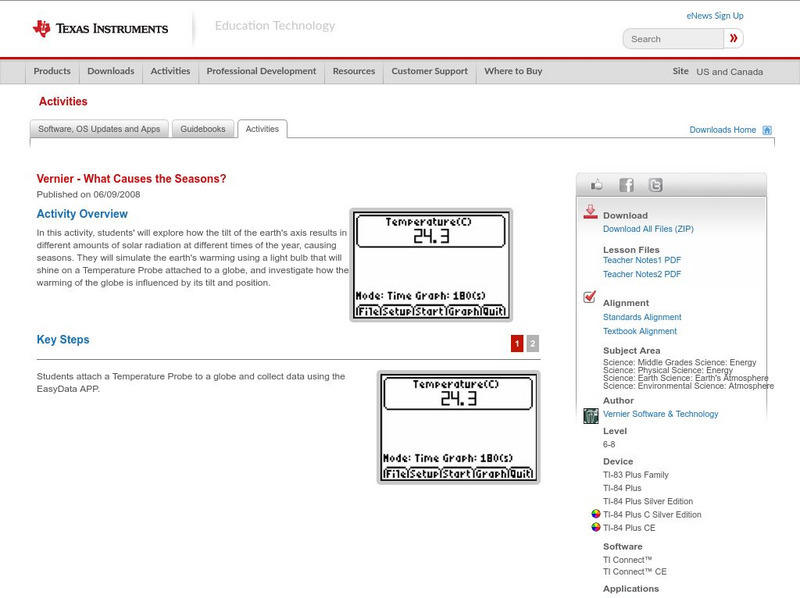Hi, what do you want to do?
Other
Space Weather Center: Our Protective Shield
The Earth's magnetosphere helps shield us from cosmic and solar radiation. This segment offers a great explanation of this abstract concept along with numerous images and diagrams. An interactive game is provided as well.
NOAA
Noaa: The Ionosphere [Pdf]
SEC produced several articles to help teachers teach about space weather. This one covers the ionosphere. It covers the characteristics, variability, and scintillation of this layer of the atmosphere. PDF format.
Geographypods
Geographypods: Patterns in Environmental Quality and Sustainability
This collection of five learning modules looks at issues related to environmental change and sustainability. Topics addressed include changes in the atmosphere, soil, water, and biodiversity, and what can be done to counteract this and...
PBS
Pbs: Dimming the Sun
This interactive resource provides evidence that human air pollution is limiting the amount of sunlight that is reaching the earth's surface.
NASA
Nasa: Space Place: What Is Space Weather?
Learn all about space weather and solar wind. Comared to the energy of these storms, Hurricane Katrina was no comparison.
University Corporation for Atmospheric Research
Ucar: Learn: The Greenhouse Effect
A detailed overview of the greenhouse effect, with explanations about Earth's atmosphere gases referred to as greenhouse gases, and the factors that influence the heat-trapping ability of a greenhouse. All information is reinforced...
Other
Planet Ark: World Environmental News
Welcome to Planet Ark's daily Reuters World Environment News - the most comprehensive source of environmental news on the Net. To read previous news stories, please use the search engine below to find stories relating to any...
University of Oregon
University of Oregon: Coriolis Effect
This site from the University of Oregon provides a great explanation of the Coriolis Effect and then gives several chart type examples to help the understanding of it.
Read Works
Read Works: Who Loves the Sun? Iguanas!
[Free Registration/Login Required] An informational text about iguanas and where they live. A question sheet is available to help students build skills in reading comprehension.
University Corporation for Atmospheric Research
Ucar: Why Does Climate Change?
Factors that have the power to change global climate can be natural, like volcanic eruptions and changes in solar energy, or caused by humans, like the addition of greenhouse gases to the atmosphere.
ClassFlow
Class Flow: Climate Intro
[Free Registration/Login Required] This flipchart is a short, basic introduction to climate. It includes solar radiation and the electromagnetic spectrum.
Oklahoma Mesonet
Oklahoma Climatological Survey: Cloud Development
This site explores the importance of clouds and how clouds are formed. Content details common atmospheric cooling mechanisms and atmospheric stability.
Curated OER
Harvard University: The Earths Orbit
Students perform many inquiry activities related to Earth's orbit. Included are recording daily temperatures, observing the sun's path over several weeks, tracking sunrise and sunset times, and angle of sunlight. Diagrams make lessons...
Curated OER
Harvard University: The Earths Orbit
Students perform many inquiry activities related to Earth's orbit. Included are recording daily temperatures, observing the sun's path over several weeks, tracking sunrise and sunset times, and angle of sunlight. Diagrams make lessons...
Texas Instruments
Texas Instruments: What Causes the Seasons?
In this activity, students' will explore how the tilt of the earth's axis results in different amounts of solar radiation at different times of the year, causing seasons. They will simulate the earth's warming using a light bulb that...
NOAA
Noaa: Weather Systems and Patterns
Imagine our weather if Earth were completely motionless, had a flat dry landscape and an un-tilted axis. This, of course, is not the case; if it were, the weather would be much different. The local weather that impacts our daily lives...
TeachEngineering
Teach Engineering: Planting Thoughts
Students gain an understanding of the parts of a plant, plant types and how they produce their own food from sunlight through photosynthesis. They also learn about transpiration, the process by which plants release moisture to the...
Exploratorium
Exploratorium: Global Climate Change: Atmosphere
Use this site to explore real scientific data relating to the atmosphere. With this information you can gather evidence, test theories, and come to conclusions. Click on the data examples to view a full scale version.
University of Chicago
University of Chicago: What's Your Slant? Sun and Shadows
This fun activity helps you to understand the movement of the sun by studying shadows.
Other
Climate Gateway: What Is Climate Change?
This ClimateGateway.com site provides information on what climate change is as well as the factors that affect global climate.
Curated OER
Aurora
The Earth's magnetosphere helps shield us from cosmic and solar radiation. This segment offers a great explanation of this abstract concept along with numerous images and diagrams. An interactive game is provided as well.
Khan Academy
Khan Academy: Practice: Anatomy of the Sun Quiz
It might look like a solid object, but the Sun is very different from Earth. Find out what it's made of, and how reactions inside the Sun generate all that energy and drive powerful solar storms. Try this quiz!
Wikimedia
Wikipedia: The Black Hole
This site examines the black hole as an object in astrophysics. Delve into this comprehensive resource that covers this concept from its history, to qualitative physics, the reality of black holes, mathematical physics and more.






![Noaa: The Ionosphere [Pdf] Handout Noaa: The Ionosphere [Pdf] Handout](https://static.lp.lexp.cloud/images/attachment_defaults/resource/large/FPO-knovation.png)
